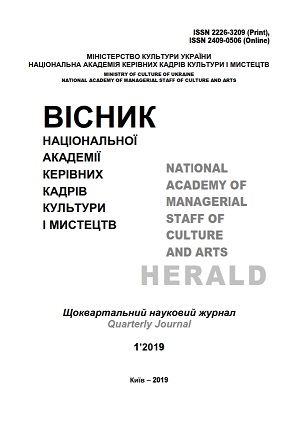Homo Parvus Mundus Est: Imagination as a Tool of Knowledge and Formation of the World
Homo Parvus Mundus Est: Imagination as a Tool of Knowledge and Formation of the World
Author(s): Viktor Vasylovych Karpov, Natalia Igorivna SyrotynskaSubject(s): Epistemology, Aesthetics, Social Philosophy, Philosophy of Mind, Culture and social structure
Published by: Національна академія керівних кадрів культури і мистецтв
Keywords: imagination; consciousness; neuroaesthetics; neuro art; interdisciplinary research;
Summary/Abstract: The purpose of the article is to identify the essence of the concept of imagination as a tool for knowledge and creation of the world. Methodology. The choice of research strategies in the disclosure of the research objectives determined the application of a systematic and integrated approach, as well as comparative and heuristic methods, due to the active development of related scientific disciplines. In this context, we also use the prognostic aspect of the research, involves the formation of new value models and symbols, reflecting the cultural and artistic forms of modern civilization. The use of these research methods contributed to obtaining the own theoretical results. The scientific novelty of the research lies in the formulation and development of a certain topic that has not received comprehensive and objective coverage in the scientific dimension and is being studied for the first time. It is validated the idea that the results of understanding the essence of imagination can serve as an essential component in the study of contemporary cultural achievements, as well as in the knowledge of the facets of human consciousness, concentrated in the field of neuroscience discoveries of modernity. Conclusions. The development of human culture presented various forms of human influence on the formation of the world. Separating imagination as a literal tool in this process determines the ability to change the world. It is accentuated that it is precisely the imagination that fully reflects the internal mechanisms of human brain, activating human activity, aimed at the knowledge and creation of the world.
Journal: Вісник Національної академії керівних кадрів культури і мистецтв
- Issue Year: 2019
- Issue No: 1
- Page Range: 226-230
- Page Count: 5
- Language: English

